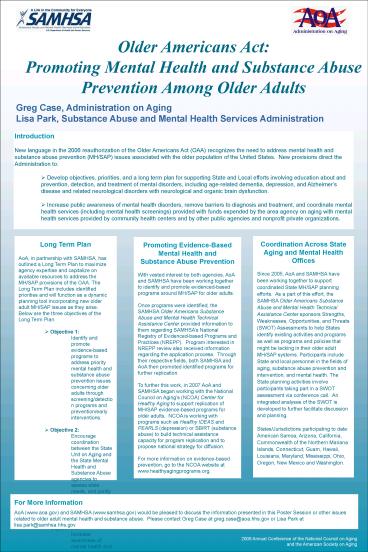Promoting EvidenceBased Mental Health and - PowerPoint PPT Presentation
1 / 1
Title:
Promoting EvidenceBased Mental Health and
Description:
Substance Abuse Prevention ... Health and Substance Abuse Prevention Among Older ... Lisa Park, Substance Abuse and Mental Health Services Administration ... – PowerPoint PPT presentation
Number of Views:21
Avg rating:3.0/5.0
Title: Promoting EvidenceBased Mental Health and
1
Older Americans Act
Promoting Mental Health and Substance Abuse
Prevention Among Older Adults
Greg Case, Administration on Aging Lisa Park,
Substance Abuse and Mental Health Services
Administration
- Introduction
- New language in the 2006 reauthorization of the
Older Americans Act (OAA) recognizes the need to
address mental health and substance abuse
prevention (MH/SAP) issues associated with the
older population of the United States. New
provisions direct the Administration to - Develop objectives, priorities, and a long term
plan for supporting State and Local efforts
involving education about and prevention,
detection, and treatment of mental disorders,
including age-related dementia, depression, and
Alzheimers disease and related neurological
disorders with neurological and organic brain
dysfunction. - Increase public awareness of mental health
disorders, remove barriers to diagnosis and
treatment, and coordinate mental health services
(including mental health screenings) provided
with funds expended by the area agency on aging
with mental health services provided by community
health centers and by other public agencies and
nonprofit private organizations.
- Long Term Plan
- AoA, in partnership with SAMHSA, has outlined a
Long Term Plan to maximize agency expertise and
capitalize on available resources to address the
MH/SAP provisions of the OAA. The Long Term Plan
includes identified priorities and will function
as a dynamic planning tool incorporating new
older adult MH/SAP issues as they arise. Below
are the three objectives of the Long Term Plan. - Objective 1
- Identify and promote evidence-based programs to
address priority mental health and substance
abuse prevention issues concerning older adults
through screening/detection programs and
prevention/early interventions. - Objective 2
- Encourage coordination between the State Unit on
Aging and the State Mental Health and Substance
Abuse agencies to assess state needs, and jointly
plan the implementation of services to meet those
needs. - Objective 3
- Increase awareness of mental health and substance
use disorders in older adults and promote use of
interventions to treat these disorders.
Coordination Across State Aging and Mental Health
Offices Since 2005, AoA and SAMHSA have been
working together to support coordinated State
MH/SAP planning efforts. As a part of this
effort, the SAMHSA Older Americans Substance
Abuse and Mental Health Technical Assistance
Center sponsors Strengths, Weaknesses,
Opportunities, and Threats (SWOT) Assessments to
help States identify existing activities and
programs as well as programs and policies that
might be lacking in their older adult MH/SAP
systems. Participants include State and local
personnel in the fields of aging, substance abuse
prevention and intervention, and mental health.
The State planning activities involve
participants taking part in a SWOT assessment via
conference call. An integrated analyses of the
SWOT is developed to further facilitate
discussion and planning. States/Jurisdictions
participating to date American Samoa, Arizona,
California, Commonwealth of the Northern Mariana
Islands, Connecticut, Guam, Hawaii, Louisiana,
Maryland, Mississippi, Ohio, Oregon, New Mexico
and Washington.
Promoting Evidence-Based Mental Health and
Substance Abuse Prevention With vested interest
by both agencies, AoA and SAMHSA have been
working together to identify and promote
evidenced-based programs around MH/SAP for older
adults. Once programs were identified, the
SAMHSA Older Americans Substance Abuse and Mental
Health Technical Assistance Center provided
information to them regarding SAMHSAs National
Registry of Evidenced-based Programs and
Practices (NREPP). Program interested in NREPP
review also received information regarding the
application process. Through their respective
fields, both SAMHSA and AoA then promoted
identified programs for further replication.
To further this work, in 2007 AoA and SAMHSA
began working with the National Council on
Agings (NCOA) Center for Healthy Aging to
support replication of MH/SAP evidence-based
programs for older adults. NCOA is working with
programs such as Healthy IDEAS and PEARLS
(depression) or SBIRT (substance abuse) to build
technical assistance capacity for program
replication and to propose national strategy for
diffusion. For more information on
evidence-based prevention, go to the NCOA website
at www.healthyagingprograms.org.
For More Information AoA (www.aoa.gov) and SAMHSA
(www.samhsa.gov) would be pleased to discuss the
information presented in this Poster Session or
other issues related to older adult mental health
and substance abuse. Please contact Greg Case at
greg.case_at_aoa.hhs.gov or Lisa Park at
lisa.park_at_samhsa.hhs.gov.
2008 Annual Conference of the National Council on
Aging and the American Society on Aging































